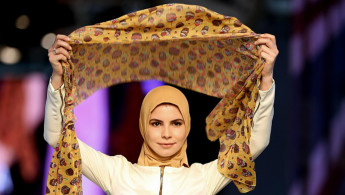Muslim fashionistas attend Turkey's International Modest Fashion Week
Seventy designers took part in the two-day event hosted by Modanisa, an online retailer of Muslim fashion, at a historic railway station flooded with spotlights for the occasion.
"[We want] to create mainstream fashion out of modest fashion and to energize Islamic communities to produce [clothing] for Muslim women," Modanisa CEO Kerim Ture said. "They want to have their rules but they also want to look chic."
In Turkey, an estimated two-thirds of women wear a headscarf, according to industry experts.
| See in pictures: Modest Fashion Week opens in Istanbul |
Modest fashion represents a growing market in the world and Turkey, with its Muslim traditions and booming textile industry, is uniquely placed to cash in both creatively and commercially.
 |
| In Turkey, an estimated two-thirds of women wear a headscarf, according to industry experts [Getty] |
Worldwide spending on Muslim clothing is projected to grow to $327 billion by 2020, according to the latest Global Islamic Economy report.
Designers say it's a budding industry in which Turkey serves as a natural bridge between European and Asian markets.
"In fashion, we have the mainstream fashion line and the modest fashion line," says Malaysian designer Hazizul Abd Aziz of Aidijuma who favours cool satins and cottons. "The modest fashion line is actually very new."
The models paraded styles ranging from earthy tunics and floral dresses to grandiose gowns in shimmering pear palettes and dark abayas - all connected by shape-concealing cuts.
The looks were set off by dashing turbans, decorative headscarves and prim chignons for the unveiled.
The fashion shows come amid a revived debate over the role of secularism in Turkey, a predominantly Muslim nation where the constitution enshrines secular principles.
 |
The fashion shows come amid a revived debate over the role of secularism in Turkey, a predominantly Muslim nation where the constitution enshrines secular principles |  |
The speaker of parliament, Ismail Kahraman, sparked controversy last month by suggesting the country should have a constitution based on religion instead.
That triggered fears among the secular segments of society and small protests in Istanbul.
Outgoing prime minister Ahmet Davutoglu said the new constitution, which is being drafted by the Islamic-rooted Justice and Development Party, would feature a freedom-oriented principle of secularism rather than an "authoritarian understanding of secularism."
 |
| Models walk the runway as they present creations at Haydarpasa Terminal during Istanbul Modest Fashion Week 2016 in Istanbul [Anadolu] |
Since the Islamist-leaning party of President Recep Tayyip Erdogan came to power in 2002, restrictions on the displays of religious symbols in public have been relaxed, allowing conservative women to get a university education and enter the workforce.
But it was not until 2013 that the ruling party succeeded in lifting a decades-old ban on the wearing of headscarves by public servants and legislators.
Franka Soeria, a representative of the Islamic Fashion and Design Council, says the divide between religiously conservative and secular environments remains palpable in Turkish society.
Soeria, who sports a black hijab - an Islamic-style headscarf - and an ankle-length abaya, told AP that some secular friends had discouraged her from going to certain Istanbul neighborhoods because her attire is too modest.
"Why? I mean, it's just a hijab. I'm still the same person. I'm still stylish. You wear a bikini, I wear my hijab," she said.
Academic Mary Lou O'Neil says the growing visibility of religiously conservative women in public spaces has sparked fear in Turkey's secular women that this will evolve into restrictions on their dress and conduct.
 |
Many younger women have also had the opportunity to travel or study abroad and speak more than one language — opportunities that translate into more economic power |  |
"In a society that said public space is neutral, religiously neutral, you now have conservative fashion week," said O'Neil, director of the Gender and Women's Studies Research Center at Kadir Has University in Istanbul.
"[It's] a visually stunning development for a lot of people and it certainly bothers a lot of people," O'Neil added.
Many studies suggest a growing number of Turkish women self-identify as "conservative" and veiled women are part of the Turkish workforce, appearing at universities and state institutions, she noted.
Many younger women have also had the opportunity to travel or study abroad and speak more than one language — opportunities that translate into more economic power.
"They want all the same things, just packaged in a slightly different way," said O'Neil.



